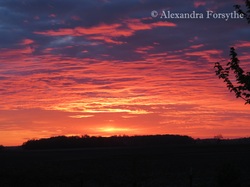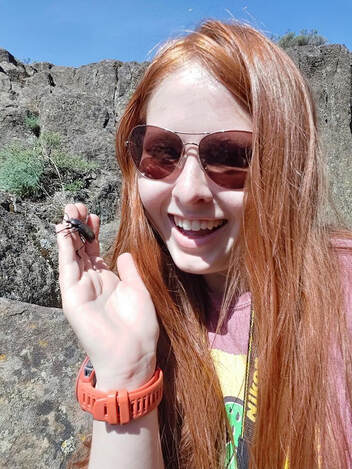
"Conservation"
What does that word mean to you and why is it important?
Merriam-Webster defines conservation as "the protection of animals, plants and natural resources, or the careful use of natural resources to prevent them from being lost or wasted."
Why is conservation important? Because we are all connected.
We all studied food webs in school. However, when we looked at the food webs, we viewed them as outsiders; humans were rarely in the diagrams. After all, we aren't in the food chain for a vulture, right? Wrong! Every mineral, plant, insect, fish, bird and mammal on the planet is connected in a very intricate web. The connections may not seem obvious at first glance, but they are there. The most obvious connection is at the base level: the dependency on fresh air and clean water.
Many people who are concerned about the planet try to "reduce, reuse and recycle". Those are fantastic and necessary first steps, but we can do so much more! This website provides some ideas, but I encourage you to use your creativity and enthusiasm to develop more ways to help and to inspire others to do the same.
Conservation is imperative to the survival of our planet. Becoming a conservationist is not optional; it is a duty that falls on each of us.
What does that word mean to you and why is it important?
Merriam-Webster defines conservation as "the protection of animals, plants and natural resources, or the careful use of natural resources to prevent them from being lost or wasted."
Why is conservation important? Because we are all connected.
We all studied food webs in school. However, when we looked at the food webs, we viewed them as outsiders; humans were rarely in the diagrams. After all, we aren't in the food chain for a vulture, right? Wrong! Every mineral, plant, insect, fish, bird and mammal on the planet is connected in a very intricate web. The connections may not seem obvious at first glance, but they are there. The most obvious connection is at the base level: the dependency on fresh air and clean water.
Many people who are concerned about the planet try to "reduce, reuse and recycle". Those are fantastic and necessary first steps, but we can do so much more! This website provides some ideas, but I encourage you to use your creativity and enthusiasm to develop more ways to help and to inspire others to do the same.
Conservation is imperative to the survival of our planet. Becoming a conservationist is not optional; it is a duty that falls on each of us.

Hello and welcome! Allow me to introduce myself. I'm Alexandra Forsythe, but please call me "Alex".
I am a wildlife enthusiast! I love every creature and plant in nature, with the possible exception of mosquitoes. Yes, I know they have their place in the food web, but I wish I were not on their menu so frequently!
I volunteer for several organizations, and I try to help wildlife as much as possible. When I was a teenager with little income and limited access to transportation, I thought I was doing all that I could.
However, I heard an inspirational speech by Dr. J. Drew Lanham that caused me reevaluate my actions. Was I really doing all that I could? Perhaps I could do more. Maybe I just needed to get creative.
I thought other young people might be searching for ways to help, as well. I decided to create this website and a Facebook page (https://www.facebook.com/YoungConservationists) dedicated toward helping children and teens find out about interesting opportunities to help nature. Adults will benefit from some of this information, as well!
Each person has unique talents and skills that can be used to help the flora and fauna. Are you an artist? Enter the Federal Duck Stamp Contest, or offer to design a display or poster for your nature club. Are you a basketball player? Ask your friends and family to pledge a quarter for every basket you make in the next game and donate that money to your local wildlife rehabilitation center. Perhaps you enjoy social networking. Set up an account on one of the various social networks to educate the public about your favorite conservation organization. Maybe you're a writer. Volunteer to write articles for your local Audubon. Are you a member of 4-H or Boy Scouts? Complete a project that allows you to educate the public about a specific conservation topic. There are so many ways you can help!
If you have suggestions, if you know of opportunities to help an organization, please email me.
Let's make sure that our generation leaves this planet in better condition than it was in before we were born. We can do it! Get creative! Take action! Inspire others!
I am a wildlife enthusiast! I love every creature and plant in nature, with the possible exception of mosquitoes. Yes, I know they have their place in the food web, but I wish I were not on their menu so frequently!
I volunteer for several organizations, and I try to help wildlife as much as possible. When I was a teenager with little income and limited access to transportation, I thought I was doing all that I could.
However, I heard an inspirational speech by Dr. J. Drew Lanham that caused me reevaluate my actions. Was I really doing all that I could? Perhaps I could do more. Maybe I just needed to get creative.
I thought other young people might be searching for ways to help, as well. I decided to create this website and a Facebook page (https://www.facebook.com/YoungConservationists) dedicated toward helping children and teens find out about interesting opportunities to help nature. Adults will benefit from some of this information, as well!
Each person has unique talents and skills that can be used to help the flora and fauna. Are you an artist? Enter the Federal Duck Stamp Contest, or offer to design a display or poster for your nature club. Are you a basketball player? Ask your friends and family to pledge a quarter for every basket you make in the next game and donate that money to your local wildlife rehabilitation center. Perhaps you enjoy social networking. Set up an account on one of the various social networks to educate the public about your favorite conservation organization. Maybe you're a writer. Volunteer to write articles for your local Audubon. Are you a member of 4-H or Boy Scouts? Complete a project that allows you to educate the public about a specific conservation topic. There are so many ways you can help!
If you have suggestions, if you know of opportunities to help an organization, please email me.
Let's make sure that our generation leaves this planet in better condition than it was in before we were born. We can do it! Get creative! Take action! Inspire others!
